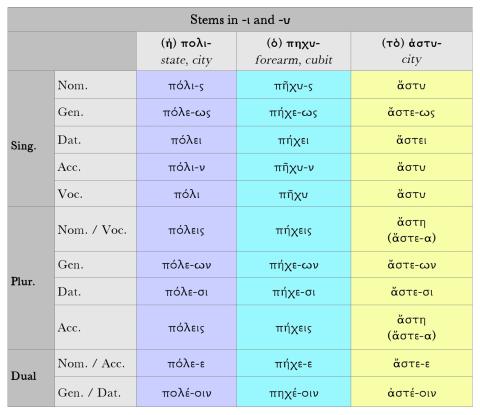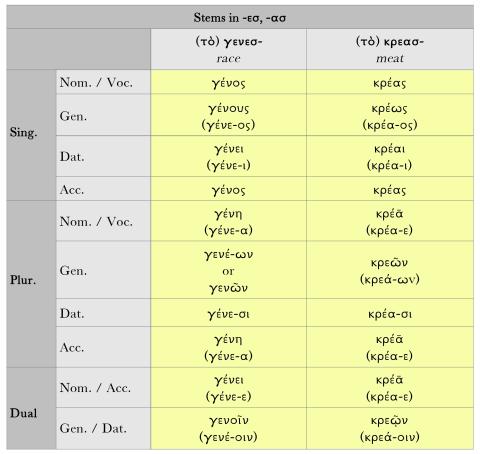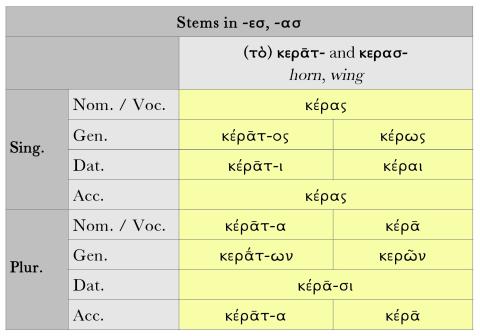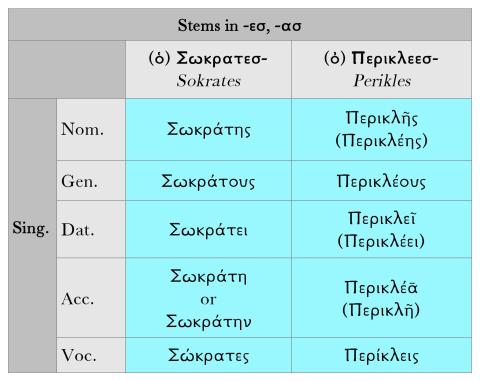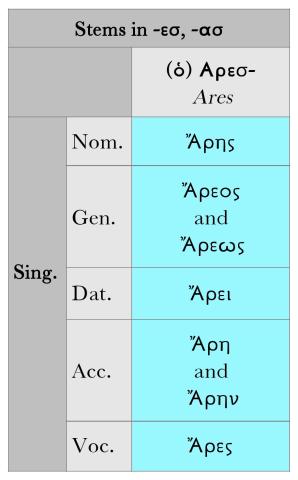1a. ἡ φρόνησις μέγιστόν ἐστιν ἀγαθόν.
1b. ἡ φύσις ἄνευ μαθήσεως τυφλὸν, ἡ δὲ μάθησις ἄνευ φύσεως ἐλλιπές.
1c. πόλεως ψυχὴ οἱ νόμοι.
1d. οὐκ ἔστιν οὐδὲν κρεῖσσον ἢ νόμοι πόλει.
1e. Ἀρίστιππος ἔφη πρὸς τὸν ἀδελφόν· μέμνησο, ὅτι τῆς μὲν διαστάσεως σὺ ἤρξω, τῆς δὲ διαλύσεως ἐγώ.
2a. ἡ ὕδραυλίς ἐστιν εὕρημα Κτησιβίου, Ἀλεξανδρέως, κουρέως τὴν τέχνην.
2b. ὁμονοούντων ἀδελφῶν συμβίωσις παντὸς τείχους ἰσχυροτέρα.
2c. ἤθους βάσανός ἐστιν ἀνθρώποις χρόνος.
2d. Πελίαν, τὸν Ποσειδῶνος καὶ Τυροῦς υἱὸν, ἵππος ἔθρεψεν.
2e. Ἀπόλλων, ὁ Διὸς καὶ Λητοῦς παῖς, ὅτε τὸν Πύθωνα κατετόξευσεν, ἦλθεν εἰς Δελφοὺς καὶ παρέλαβε τὸ μαντεῖον τῆς Γῆς.
2f. αἰδοῦς παρὰ πᾶσιν ἄξιος ἔσει, ἐὰν πρῶτον ἄρξῃς σαυτὸν αἰδεῖσθαι.
3a. οἱ ὄφεις τὸν ἰὸν ἐν τοῖς ὀδοῦσιν ἔχουσιν.
3b. ὁ Παρνασσὸς μέγα καὶ σύσκιον ὄρος ἐστίν.
3c. ἐν Βοιωτίᾳ δύο εἰσὶν ἐπίσημα ὄρη, τὸ μὲν Ἑλικὼν καλούμενον, ἕτερον δὲ Κιθαιρών.
3d. ὁ Νεῖλος ἔχει παντοῖα γένη ἰχθύων.
3e. κέρδη πονηρὰ ζημίαν ἀεὶ φέρει.
3f. λιμὸς μέγιστον ἄλγος ἀνθρώποις ἔφυ.
3g. ξίφος τιτρώσκει σῶμα, τὸν δὲ νοῦν λόγος.
3h. Δημήτριος ὁ Πολιορκήτης βίᾳ ᾕρει τὰς πόλεις, κατασείων τὰ τείχη, Τιμόθεος δὲ πείθων.
3i. ἐγένετο κατὰ τοὺς Τιβερίου χρόνους ἀνήρ τις Ἀπίκιος, ἀφ’ οὗ πλακούντων γένη πολλὰ Ἀπίκια ὀνομάζεται.
3j. τίμα τοὺς γόνεις.
3k. Αἰακὸς τὰς κλεῖς τοῦ ᾅδου φυλάττει.
3l. οἱ πολύποδες ἐλλοχῶσι τοὺς ἰχθῦς.
3m. Ἀνάχαρσις τὴν ἄμπελον εἶπε τρεῖς φέρειν βότρυς· τὸν πρῶτον, ἡδονῆς· τὸν δεύτερον, μέθης· τὸν τρίτον, ἀηδίας.
notes
See Goodell, Stems in -ι and -υ (πόλις, πῆχυς, ἄστυ) and Stems in -εσ, -ασ (γένος, κρέας).
1a. μέγιστον: superlative > μέγας.
1b. τυφλὸν: supply χρῆμά ἐστι, “is a blind thing."
ἐλλιπές: supply again χρῆμά ἐστι, “is a defective thing." The adjective is often put in the neuter with a masculine or feminine noun, χρῆμα or some equivalent term being understood.
1c. Πόλεως ψυχή, etc.: The order is οἱ νόμοι (εἰσὶ) ψυχὴ πόλεως.
1d. οὐκ ἔστιν οὐδὲν: "there is nothing.” Two negatives in Greek make a stronger negation (G 487)
1e. ἔφη: “said,” 3rd sing. impf. ind. > φημί.
μέμνησο: “ remember,” 2nd sing. perf. imperat. pass. > μιμνήσκω, and the passive is here used in a middle sense, “remind yourself,” i.e. “ remember."
διαστάσεως: gen. sing. > διάστασις. "resolution," "reconciliation"
ἤρξω: “did begin,” 2nd sing. 1st aor. ind. mid. > ἄρχω.
διαλύσεως: gen. sing. > διάλυσις.
ἐγώ: nom. to ἠρξάμην understood; 1st sing. 1st aor. ind. mid. > ἄρχω.
Ἀλεξανδρέως: “an Alexandrian,” gen. sing. > Ἀλεξανδρεύς.
2a. κουρέως τὴν τέχνην: "a barber by trade.”
κουρέως: gen. sing. > κουρεύς.
τέχνην: accusative of respect, G. 537
2b. Ὁμονοούντων ἀδελφῶν συμβίωσις: “the union of concordant brothers"
ὁμονοούντων: gen. pl. pres. part. act. > ὁμονοέω.
ἰσχυροτέρα: comparative > ἰσχυρός.
2c. Ἤθους βάσανος: “a touchstone of character,” i.e., a test of character.
2d. ἴππος ἔθρεψεν: “a mare nurtured”
ἔθρεψεν: 3rd sing. 1st aor. ind. act. > τρέφω.
2e. τὸν Πύθωνα: “the serpent Python."
κατετόξευσεν: “ he had shot with an arrow,” 3rd sing. 1st aor. ind. act. > κατατοξεύω. The aorist is here rendered into our idiom by a pluperf.
ἦλθεν: “came,” 3rd sing. 2nd aor. ind. act. > ἔρχομαι.
παρέλαβε: “took over,” "assumed the care of," 3rd sing. 2nd aor. ind. act. > παραλαμβάνω.
τῆς Γῆς: “of the goddess Earth.”
2f. Αἰδοῦς: “of respect.” The genitive is governed by ἄξιος.
ἔσει: “you will be,” 2nd sing. fut. > εἰμί, with the Attic termination (-ει), in place of the more common form, ἔσῃ (G. 384)
ἐὰν πρῶτον ἄρξῃς: “if you shall have first begun."
ἄρξῃς: 2nd sing. 1st aor. subj. act. > ἄρχω.
αἰδεῖσθαι: “to respect,” pres. inf. mid. > αἰδέομαι.
3a. ἔχουσιν: 3rd pl. pres. ind. act. > ἔχω.
3b. Ὁ Παρνασσὸς: “Parnassus.” The article is here emphatic. Literally, “ the (far-famed) Parnassus."
3c. εἰσὶν: “there are,” 3rd pl. pres. ind. > εἰμί.
τὸ μὲν: “the one,” literally, “this one indeed.” Consult note to First Declension, B2.
καλούμενον: “called,” pres. part. pass. > καλέω, agreeing in the neuter with ὄρος understood after τὸ.
3d. ἔχει: “ contains,” 3rd sing. pres. ind. act. > ἔχω.
3e. Κέρδη: nom. pl. > κέρδος.
φέρει: 3rd sing. pres. ind. act. > φέρω. A singular verb with a neuter plural (κέρδη).
3f. ἔφυ: “is,” 3rd sing. 2nd aor. ind. act. > φύω, taking the place of ἐστί.
3g. τιτρώσκει: 3rd sing. pres. ind. act. > τιτρώσκω.
3h. Δημήτριος ὁ Πολιορκήτης: "Demetrius Poliorcetes," literally, "Demetrius the city-besieger," an appellation given to Demetrius, son of Antigonus, from his skill in besieging and taking cities.
ᾕρει: “ used to take,” 3rd sing. imperf. ind. act. > αἱρέω.
κατασείων τὰ τείχη: “shaking down their walls,” i.e., by his military engines, many of which he himself invented; κατασείων, pres. part. act. > κατασείω.
πείθων: “by persuading,” i.e., by the force of persuasion and mild measures in negotiation; πείθων, pres. part. act. > πείθω.
3i. Ἐγένετο: “there was."
κατὰ: “during."
ἀφ’ οὗ: “from whom,” = ἀπὸ οὗ, the final vowel of ἀπό being cut off by apostrophe, and the preceding consonant aspirated
οὗ: gen. sing. > ὅς, ἥ, ὅ, the relative pronoun (G. 214)
πλακούντων: gen. pl. > πλακόεις, "flatbreads," "pastries"
ὀνομάζεται: 3rd sing. pres. ind. pass. > ὀνομάζω. A singular verb with a neuter pl. (γένη).
3j. Τίμα: “ honor,” 2nd sing. pres. imperat. act. > τιμάω, contracted from τίμαε.
τοὺς “your"
3k. κλεῖς: acc. pl. > κλεῖς, contracted from κλεῖδας.
φυλάττει: 3rd sing. pres. ind. act. > φυλάττω.
3l. πολύποδες: nom. pl. > πολύπους.
ἐλλοχῶσι: 3rd pl. pres. ind. act. > ἐλλοχάω
3m. τῆν ἄμπελον εἶπε, etc.: “said that the vine bore three clusters.” These three clusters are intended to mark, in a figurative manner, the three stages in the history of intemperance. Wine first attracts and pleases, then intoxicates, and finally brings with it loathing remorse.
εἶπε: 3rd sing. 2nd aor. indic. act. > εἴπω.
φέρειν: pres. inf. act. > φέρω, having the accusative ἄμπελον before it.
vocabulary
(1)
φρόνησις -εως, ἡ: wisdom, intelligence
ἄνευ (+ gen.): without
τυφλός -ή -όν: blind
ἐλλιπής -ές: deficient, incomplete
ψυχή -ῆς, ἡ: soul, spirit
νόμος -ου, ὁ: law
κρείσσων -ον: stronger, superior
Ἀρίστιππος -ου, ὁ: Aristippus
ἀδελφός -οῦ, ὁ: brother
μέμνημαι, μεμνήσομαι: remember (perfect with present sense)
διάστασις -εως, ἡ: separation, estrangement
ἄρχω, ἄρξω, ἦρξα: begin, rule (with gen.)
διάλυσις -εως, ἡ: dissolution, reconciliation
(2)
ὕδραυλις -εως, ἡ: hydraulic organ
εὕρημα -ατος, τό: invention, discovery
Κτησίβιος -ου, ὁ: Ctesibius (Alexandrian inventor)
κουρεύς -έως, ὁ: barber
τέχνη -ης, ἡ: skill, art
ὁμονοέω, ὁμονοήσω, ὡμόνεησα: be of one mind, agree
συμβίωσις -εως, ἡ: living together, cohabitation
τεῖχος -ους, τό: wall
ἰσχυρός -ά -όν: strong, mighty
ἦθος -ους, τό: character, moral nature
βάσανος -ου, ἡ: test, trial
χρόνος -ου, ὁ: time
Πελίας -ου, ὁ: Pelias (mythological king)
Τυρώ -οῦς, ἡ: Tyro (mythological figure)
ἵππος -ου, ὁ: horse
τρέφω, θρέψω, ἔθρεψα: nourish, rear
κατατοξεύω, κατατοξεύσω, κατετόξευσα: shoot down (with arrows)
μαντεῖον -ου, τό: oracle, prophetic shrine
Γῆ -ῆς, ἡ: Earth (as a deity)
αἰδώς -οῦς, ἡ: reverence, respect, modesty
ἄξιος -α -ον: worthy, deserving
αἰδέομαι, αἰδέσομαι, ᾐδεσάμην: feel shame or respect
(3)
ὄφις -εως, ὁ: snake
ἰός -οῦ, ὁ: venom, poison
ὀδούς -όντος, ὁ: tooth
Παρνασσός -οῦ, ὁ: Parnassus (mountain)
σύσκιος -ον: shady, covered with shade
ἐπίσημος -ον: prominent, notable
ὄρος -ους, τό: mountain
Ἑλικών -ῶνος, ὁ: Helicon (mountain)
Κιθαιρών -ῶνος, ὁ: Cithaeron (mountain)
γένος -ους, τό: kind, race, sort
ἰχθύς -ύος, ὁ: fish
κέρδος -ους, τό: gain, profit
πονηρός -ά -όν: wicked, base
ζημία -ας, ἡ: penalty, loss, damage
λιμός -οῦ, ὁ: hunger, famine
ἄλγος -ους, τό: pain, suffering
τιτρώσκω, τιτρώξω, ἔτρωσα: wound
σῶμα -ατος, τό: body
Δημήτριος -ου, ὁ: Demetrius (Poliorcetes)
Πολιορκητής -οῦ, ὁ: Besieger (epithet)
βίᾳ (adv.): by force
αἱρέω, αἱρήσω, εἷλον: take, capture
κατασείω, κατασείσω, κατεσάλευσα: shake violently
Τιμόθεος -ου, ὁ: Timotheus
πείθω, πείσω, ἔπεισα: persuade
Τιβέριος -ου, ὁ: Tiberius (Roman emperor)
Ἀπίκιος -ου, ὁ: Apicius (gourmand)
πλακοῦς -οῦντος, ὁ: cake, flatbread
γένος -ους, τό: kind, type
τίμα, τιμήσω, ἐτίμησα: honor, esteem
γονεύς -έως, ὁ/ἡ: parent
Αἰακός -οῦ, ὁ: Aeacus (mythological judge of the dead)
κλείς -ίδος, ἡ: key
ᾍδης -ου, ὁ: Hades, the underworld
πολύπους -ποδος, ὁ: octopus, many-footed creature
ἐλλοχάω, ἐλλοχήσω, ἠλλόχησα: lie in wait, ambush
ἄμπελος -ου, ἡ: vine
βότρυς -υος, ὁ: grape cluster
μέθη -ης, ἡ: drunkenness
ἀηδία -ας, ἡ: disgust, loathing

